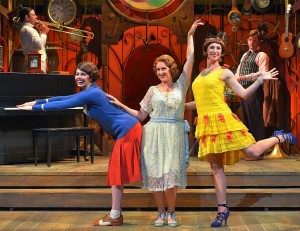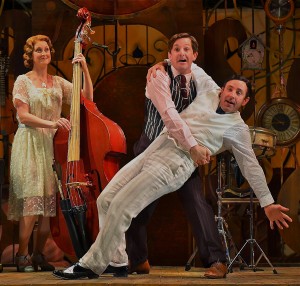Woody’s [rating:2.5]

Three sisters — from left, Jenny June (Liz Sklar), Gertrude (Megan Smith) and Nelly (Kathryn Zdan) — display temporary happiness in “Failure: A Love Story,” accompanied by Brian Herndon on trombone and Patrick Kelly Jones on snare drum. Photo: Kevin Berne.
My main takeaway from “Failure: A Love Story” is that the Grim Reaper doesn’t always have to be grim.
He can, if re-imagined, almost be the life of the party.
Philip Dawkin’s curious tragicomedy, as inventively stylized by director Jasson Minadakis at the Marin Theatre Company with a hefty overlay of music, flourishes in numerous ways.
But it trips over its own ingenuity in others.
All five actors are outstanding. Costumes by Jacqueline Firkins are sunny and upbeat. The clock- and instrument-packed art deco set by scenic designer Nina Ball, though cluttered, has a lot of eye appeal. And the lighting effects are effective.
But the play itself, with third-person narratives that are staggeringly verbose, is too cutesy.
Besides, I believe, it tries too hard.
We’re told early on, and then again and again and again in a feeble swing at humor, that the three perky Fail sisters die after a blunt object to the head, a watery disappearance and consumption “in that order.”
But death can’t stop any of them from first finding love — in the form of one guy, an investor in stocks who also invests in women.
Mortimer Mortimer (played charmingly by Brian Herndon) initially falls for Nelly (a bouncy Kathryn Zdan), but ends up as a hand-me-down serial suitor for both Jenny June (a buoyant Liz Sklar) and Gertrude (Megan Pearl Smith as a held back mother hen).
Mort (an undisguised reference to death) also befriends their adopted brother, John N. (an appropriately cheerless Patrick Kelly Jones), found as a baby floating down the river in a basket.
As John N. matures, he clings to critters rather than humans, making friends of the snake, which has evolved into a huge, spitting boa constructor called Moses; a dog, Pal; and two green parakeets — all puppets.
Death thrives.
And is almost as ubiquitous as the play’s bad puns, especially about time, as the sisters keep their parents’ clock shop functioning.
Not only do all three girls expire, following the accidental demise of mom and dad, but a couple of animals perish as well.
And then there’s a stillborn baby.
Sad?
Not really, at least not until the end of the 1928 Chicago-centric play is nigh.
Dawkins and Minadakis conspire to use Jazz Age music to ward off any heavy audience gloom-and-doom sensations.
Unfortunately, the MTC distancing gambit works too well.
Upon learning in advance that the sisters die, I became protectively distanced from them. And my difficulty in relating was amped up, later, by Mort’s being unable to touch either Jenny June or Gertie physically.
“Failure,” I found, also was burdened, beneath a glitzy exterior, with philosophical tenets never fully resolved. Like one character declaring that just because something ends, that “doesn’t mean it ain’t a great success.”
Dawkins gives directors free rein on staging the show.
A good idea?
Well, Minadakis commissioned original songs by musical director Chris Houston that supplemented standards like “In the Good Old Summertime,” “Let Me Call You Sweetheart,” “Lover, Come Back to Me” and “I Can’t Give You Anything But Love.”
Those musical reproductions should have fit exquisitely. But the players were sometimes melodically challenged.
Their voices and instruments — which include mandolin, piano, bass, guitar, violin, flute and horn from a Gramophone — were sometimes off key, sometimes flat, sometimes sharp.
But my favorite moment came when Herndon, then enamored with Jenny June, who yearned to swim across Lake Michigan, comically vocalizes his jealously of her idol, Johnny Weissmuller, an Olympic swimming champ.
Including Weissmuller’s throaty Tarzan movie yell.
Marinites who are chauvinists will relish the fact that three of the five actors are Marin natives — Jones hails from Larkspur, Sklar claims both Kentfield and Lucas Valley as home base, and Zdan is from Mill Valley.
Each person involved in “Failure” (behind-the-scenes folks, cast and crew) must be given credit for offering something fresh to an audience willing to take a chance.
Though the show falls short of wonderful, its peek at time travel and mollifying death is praiseworthy.
Flawed, yes; failure, no.
“Failure: A Love Story” plays at the Marin Theatre Company, 397 Miller Ave., Mill Valley, through June 29. Tickets: $20 to $58. Information: (415) 388-5208 or www.marintheatre.org.



